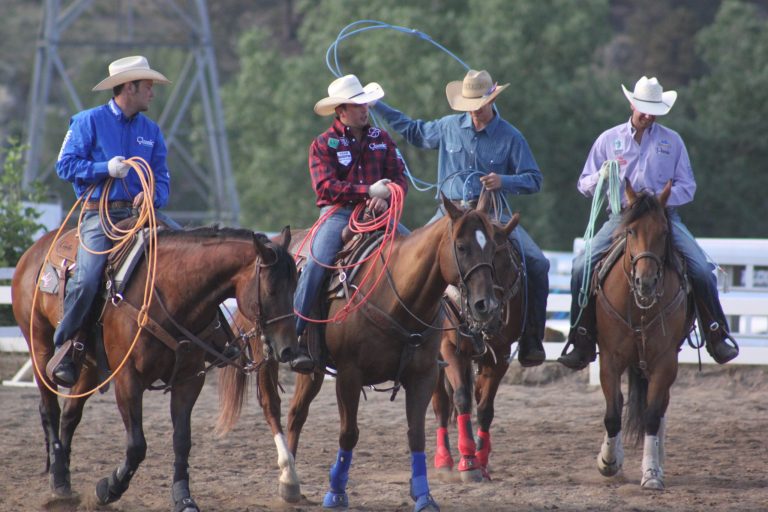LANCE ALLEN WAS warming up his hands after just bringing in a new set of steers from the frozen pens outside for the #9 World Series of Team Roping qualifier at The Ranch in Loveland, Colorado.
He was walking through the Ranchway Feeds Arena toward the announcer stand when he heard his announcer call for Gering, Nebraska’s Justin Cunningham a third time Sunday morning, Feb. 11. Odd, Allen thought. There are ropers that would miss a #9 first thing on a bitter cold Sunday after a wild Saturday night out, but Justin, a 27-year-old pharmacist, wasn’t one of them. Lance, who’s rodeoed most of his life and produced team ropings for the last eight years, had a bad feeling about this, right from the start. But he went to his office to make sure his secretary didn’t make a mistake with her sheets, because he knew Justin wasn’t one to err in checking his draw.
“Usually when somebody gets turned out that early in the roping, that flags me to pay attention and make sure we hadn’t done anything wrong,” Lance, owner of Mountain States Cattle Co., said. “I made sure he’d paid for all of his runs. Then come to find out, his usual partners for the #10, which was the first roping that day, hadn’t entered with him because they couldn’t get a hold of him. And then they said he didn’t check his dog in with the babysitter for the day. That’s when I figured something wasn’t right.”
Justin hadn’t rented out an RV parking plug in, Lance discovered when he checked in at the office. While in the office, Lance figured out which stalls Justin had reserved for his two horses—Hank, a blaze-faced sorrel, and Cooper, a palomino—and went to see if the bronc-rider-turned-pharmacist was knelt down, running late, and putting his horses’ boots on in the shavings.
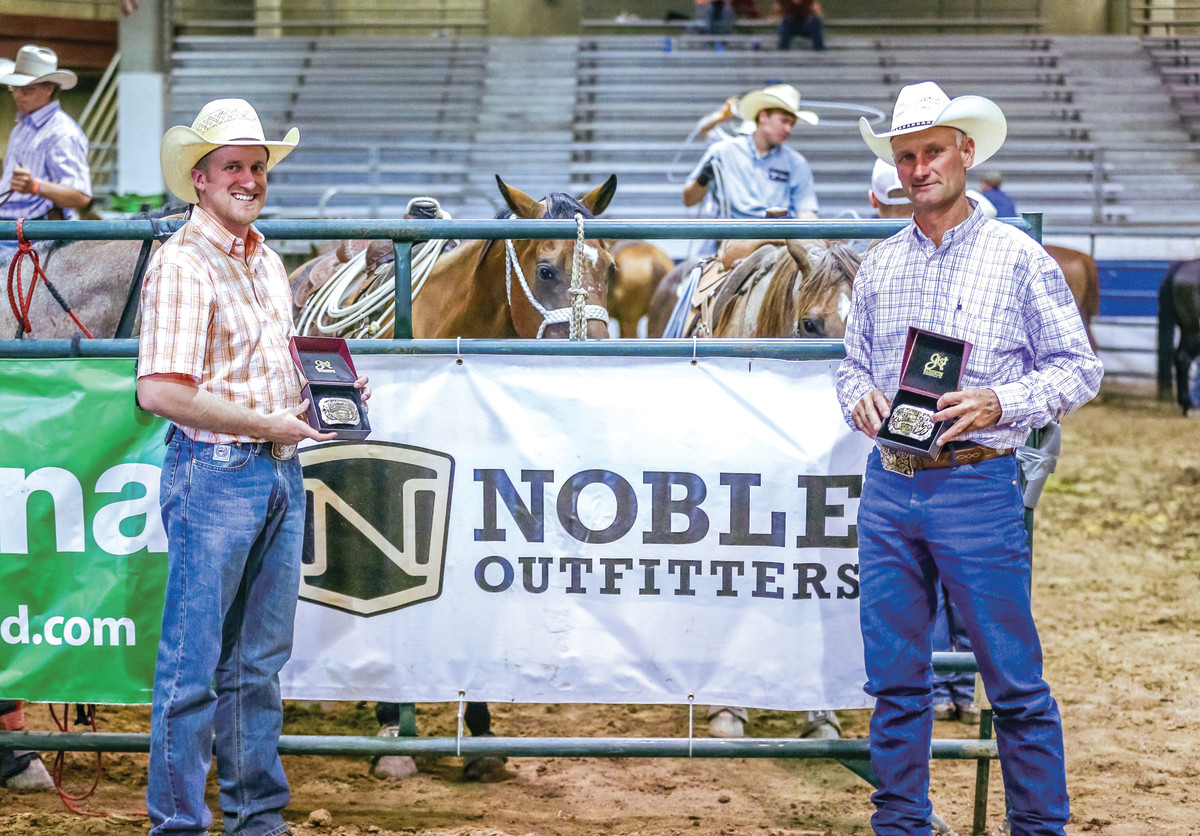
Justin Cunningham was born April 6, 1990, in Yankton, South Dakota, the oldest son of Gail and Suzanne Cunningham. He grew up in Bloomfield, Nebraska. He could read by age 3, and started picking apart words even then. In sixth grade, the little blond kid read and analyzed Margaret Mitchell’s post-Civil War novel Gone With the Wind, and he was eaten up by helping his dad ride colts. He loved to go out to eat, and strawberry rhubarb pie and fried chicken were his favorites. By seventh grade, Justin had read Ayn Rand’s The Fountainhead and had asked the head of the high school English department to discuss its meanings.
“He always had a need to know,” Suzanne, who works for Bloomfield Community Schools’ technology department, said. “When he didn’t know, he found out. Even before we had Internet, he found a way to find out. He’d ask, or he’d look it up.”
And when Justin wasn’t studying, he was either working for a local pharmacist in town as a hired man, or in the arena with his dad and younger brother, Dalton.
“He’d rather hang out with his family and rope than go out with his friends,” Gail, who works for Vestas, troubleshooting wind turbines, remembered. “When we started roping, myself and my boys all learned together. We were breaking outside horses, and starting to train our own horses to rope. I suppose Justin was around 10 or 12 years old when he started roping. He had to learn to rope and learn to teach his horse to rate, all at the same time. That made him a really good roper in the end, and just a hand. He knew a lot about breaking and training horses. As soon as I got a week or two into them, I’d hand them off to Justin, and he’d get them to flex, really get them riding around.”
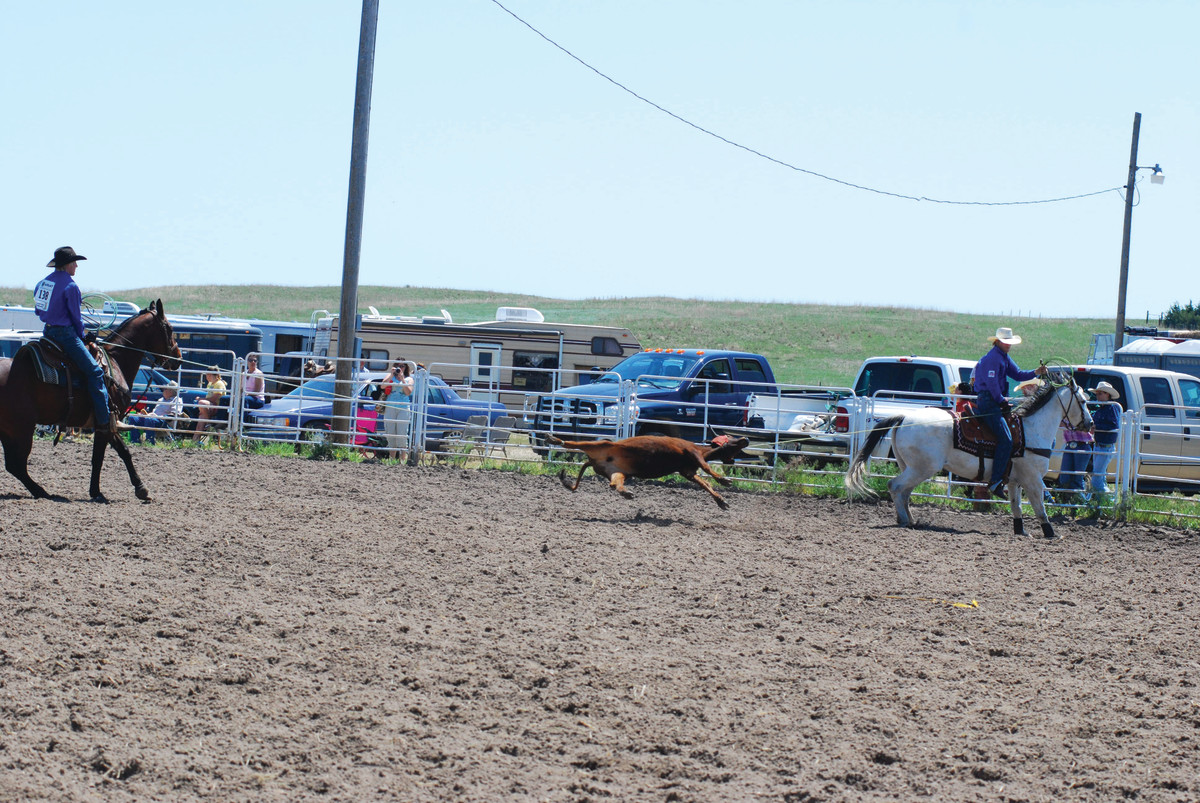
Justin and Dalton got into 4H and youth rodeo, with Justin riding saddle broncs and team roping, and Dalton, the stickiest of the two boys, riding bulls. Justin couldn’t stand to miss one of his brother’s rides.
“Justin was his biggest fan,” Suzanne said. “Dalton was quite honored and had an accomplished bull riding career through high school. And Justin was so proud of him. Justin loved to ‘review’ Dalton’s bullriding videos, offering suggestions as he understood it and knew Dalton had a special talent.”
“We had our fair share of fights,” Dalton said. “He always would pull my rope, and help me out. He always tried coaching me and we’d always butt heads. I’d tell him he never rode bulls so he couldn’t tell me what to do.”
In high school rodeo, Justin, who went to the National High School Finals Rodeo in 2007 to ride bucking horses, met Shaylee Jobman. The daughter of Steve and Sherry Jobman, a rodeo family who own an arena in Bayard, Nebraska, lived across the state from the Cunninghams’ Bloomfield home. But the families bonded quickly, and the parents became best friends right along with their kids. Spencer Jobman, Shaylee’s brother, was a few years younger than Justin, but the pair quickly became inseparable.
“Justin and Spencer looked a lot alike,” Sherry said. “Justin was an athlete and played sports in high school, and Spencer is a phenomenal athlete. They just had a lot in common.”
Justin headed off to college to be a pharmacist—a degree that takes six years and requires a doctorate—at South Dakota State University in Brookings, South Dakota.
“Justin said in fifth grade he would be a pharmacist because he thought he’d be able to do it and he’d be able to rope on the weekends,” Suzanne said. “Little did we know he’d stick with it. He called me a few times from the library in college. He felt like a nerd; he was down. He said it was so hard, and I told him to do his best—this was all I ever asked. He had his fair share of fun, don’t get me wrong, but I told him someday all this feeling like a nerd would pay off.”
On a pharmacy rotation, an internship-like experience required to graduate pharmacy school, he found himself working in Western Nebraska and bunking at the Jobmans.
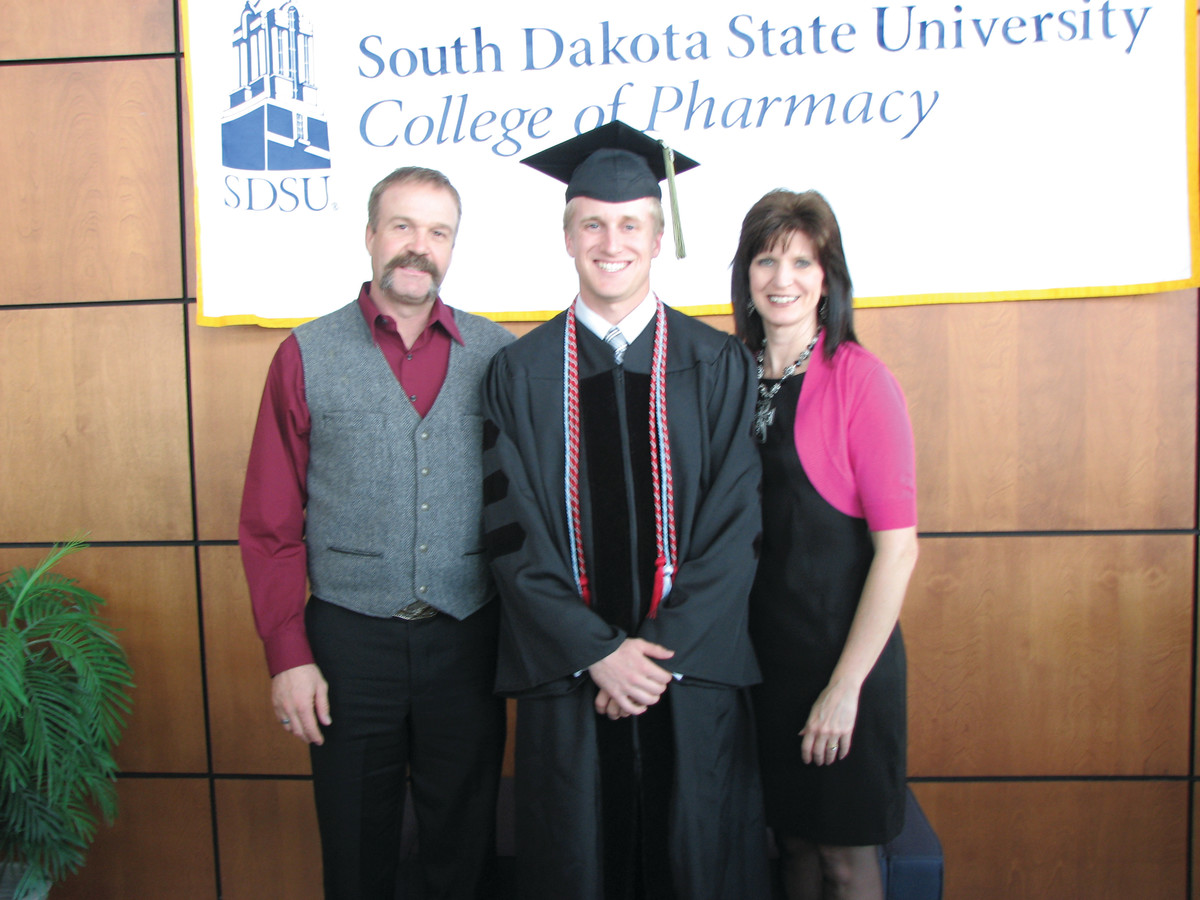
“He brought five horses when he came for five weeks,” Sherry remembered with a chuckle. “Justin went out and waited for Steve to get home every night. He’d get all of his work done, get all of his horses caught, and saddled, and he’d ride his colts. We’d rope for three or four hours every night. Justin was one of those kids who wanted to be the best at everything he could be. My husband has taught lots of people to rope, and Justin absorbed everything he could tell him.”
Spencer was in Torrington, Wyoming, heading to a barrel race to watch his wife, Justine, when Lance and fellow Nebraska roper Tucker White called him from the roping that cold morning. The Jobmans—all higher-numbered ropers—had left Loveland Saturday night because they couldn’t rope in the #10 and #9 on Sunday, but Lance and Tucker knew Spencer would be their best bet to find Justin.
Spencer told Lance and Tucker what truck Justin was driving—his black Chevy with Nebraska plates, pulling a four-horse trailer with a weekender package up front, the same one he’d had since high school. It was parked in front of the arena, right there in the first row. Nearly every roper had walked by it that day to get into the stall barn, but nobody took notice of the generator running in the horse compartment, with the drop-down windows and vents open, extension cord neatly coiled and looped through the d-rings and plugged into the living quarters.
“We stayed on the phone with Spencer the whole time,” Lance said. “The more panicked we got, the more panicked he got. I told Spencer the generator was still running.”
“I told them ‘Open the damn door,’” Spencer said.
After pharmacy school, Justin, at only 25, took a job with K-Mart Pharmacy in Western Nebraska and was back at the Jobmans again. He shot up the ranks in his new field, and became a district manager for K-Mart pharmacies with a territory that covered up to 26 stores in Colorado, Wyoming, Nebraska, Utah, Montana, and occasionally New Mexico and Idaho. He traveled for days at a time, but when he wasn’t on the road, he was working at the Jobmans’ kitchen table.
“He sat at my kitchen table across from me, and we tried to solve the problems of the world,” Sherry said. “Over time, of course, he became part of our family. He was loved—and he was a unique character! He could argue! He would argue just to explore another answer even if he didn’t agree with it. He was an incredibly intelligent person.”
While living in Western Nebraska, Justin, Dalton, and some friends went to a concert in Kearney—Red Dirt on the River, featuring Texas and Red Dirt artists Wade Bowen, Stoney LaRue, and the Randy Rogers Band. There, he met a Kansas nurse named Abby Kijowski.
“He told me proudly that he was a doctor,” Abby said. “He got a smirk on his face, and I said ‘What kind of doctor?’ I was really over guys at the time. He told me he was a pharmacist, and I said, ‘I’m a nurse.’ And then he just said, ‘So nothing I’m going to say right now is going to impress you?’ and I told him, ‘Nope.’ But I guess he did impress me.”
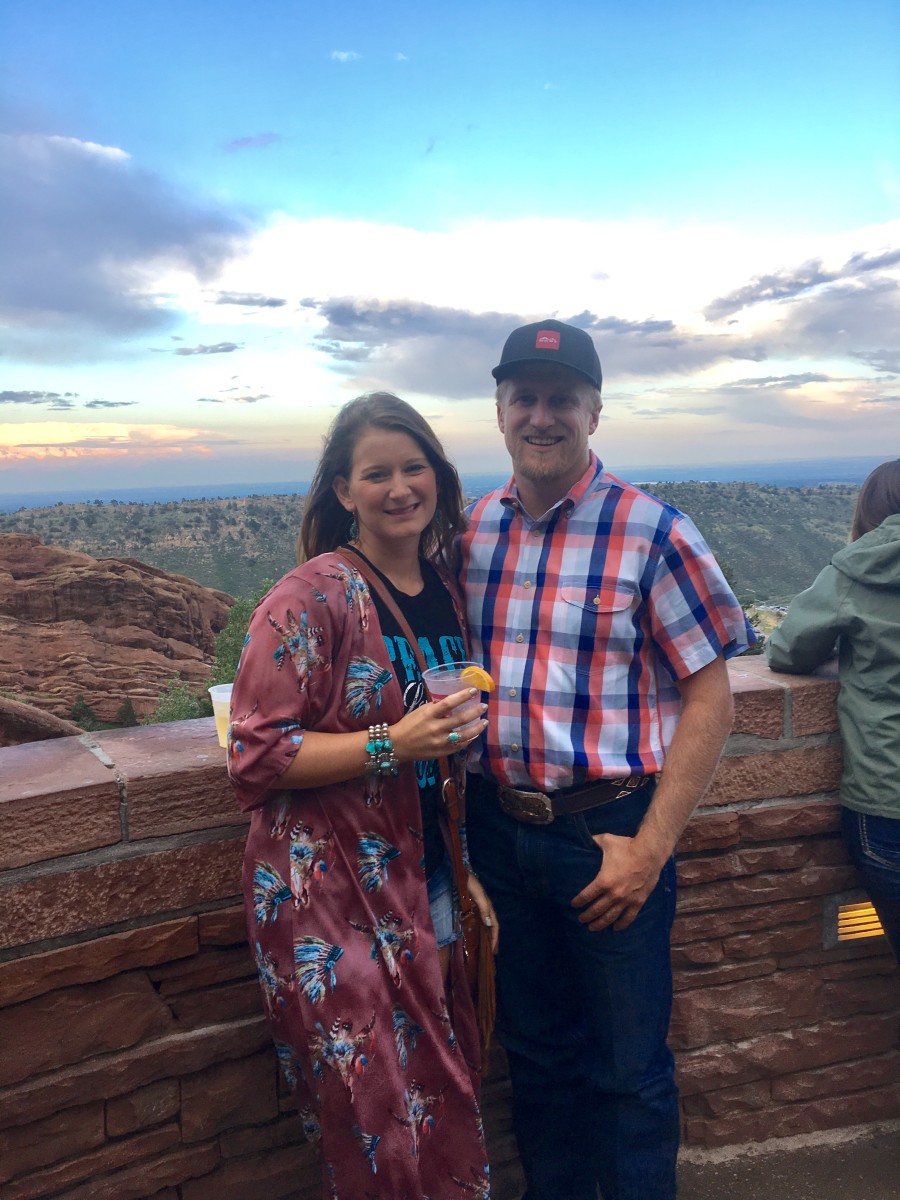
Abby and Justin became a couple, and eventually Justin bought a place about 10 miles from the Jobmans. He bought a dog, too—a Corgi he called Maizy.
“He built her a fenced-in yard at their place with the help of his dad and Abby’s dad,” Suzanne said. “He loved her. She went everywhere with him. He loved that little dog. He loved her like she was a child—it was crazy.”
There in Western Nebraska, Justin was building the cowboy life he dreamed of, the dream that got him through those late nights studying in the library.
“If he could have roped every day, that was his dream,” Abby said. “He joked that I should go back to nurse anesthetist school so he could be a stay-at-home dad someday. He was joking, but there was a hint of seriousness there. With the Jobmans’ indoor so close, he would go put the wraps on as many days as he could. That was his passion for sure. He did pharmacy—he had to make a living to support his roping.”
Justin’s hard work in the practice pen was paying off, too. He won the #8 World Series of Team Roping qualifier in Cheyenne, Wyoming, worth $6,290, produced by JX2 and called The Daddy, with Shawn Vineyard, plus $600 for their short-go fast time.
On Sept. 16, 2017, Justin was Dalton’s best man at his wedding. He was just beaming with pride. Justin choked up while giving the best man speech at the reception, totally out of character for him. Despite their boyish arguing over the years, the wedding was an indication of the unconditional love and support the brothers had for each other.
Dalton and his wife, Shaunna, were Justin’s biggest fans in the roping pen, too, and went to watch him in 2016 and 2017 when he competed in Las Vegas at the World Series of Team Roping Finale.
“I could tell he was happy to have us out there,” Dalton said. “He had a couple NFR tickets for a night while we were there, and he gave them to us and let us use them. He was always thinking of other people.”
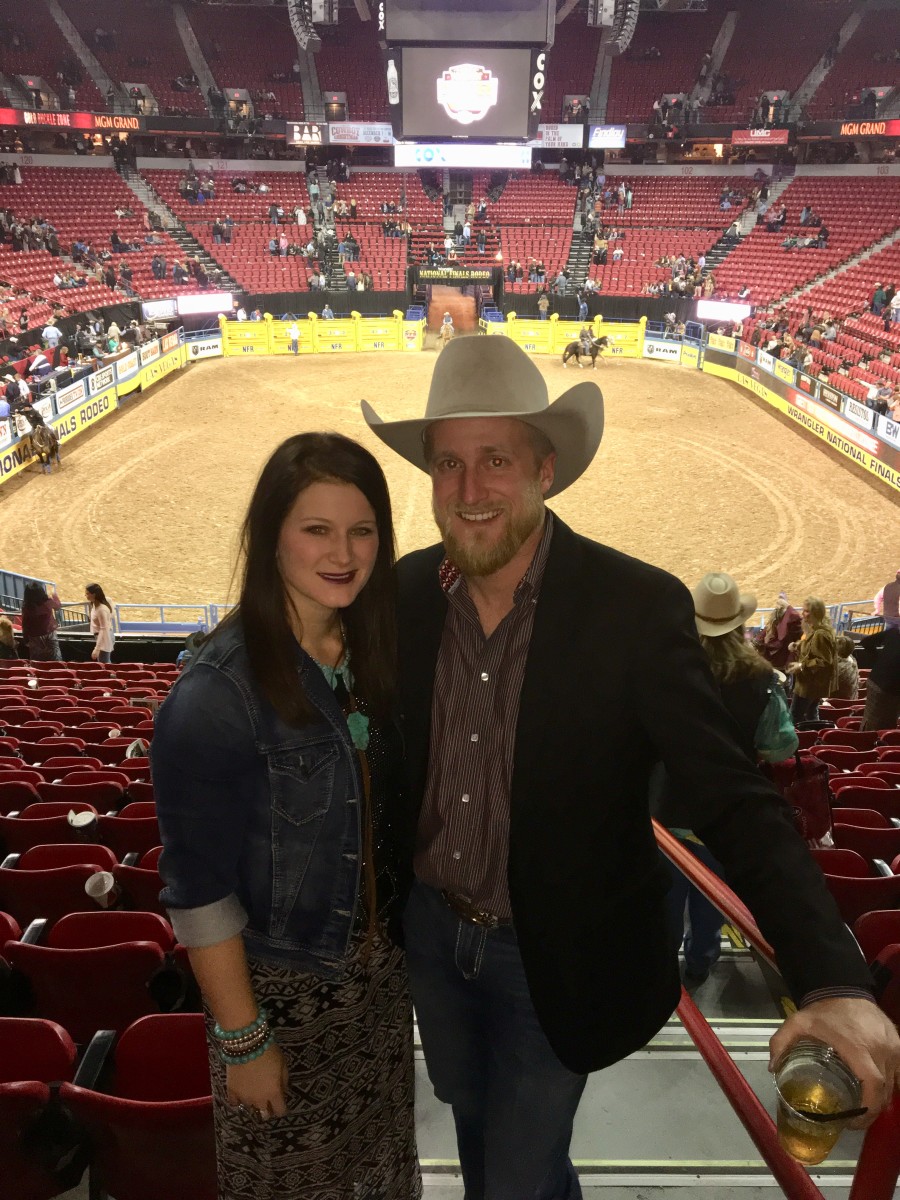
Abby almost always went with Justin to jackpots, especially World Series of Team Roping qualifiers in Loveland. It was one of their favorite trips, given the fun bar and restaurant nearby that they usually went to after the roping. But Abby had planned a girls’ weekend with friends in Las Vegas, and they were going to the City of Lights for just 24 hours. Abby spent Saturday, Feb. 10, in Vegas, flying back into Denver on Sunday morning. Before she went to bed Saturday night, she and Justin exchanged a few text messages celebrating his win that day worth $6,840 in the #11 WSTR qualifier with Terrel Vineyard.
“He was so pumped,” Abby said. “He knew I was with my friends, but he wanted me to know he won. He joked that maybe I shouldn’t come rope anymore because he always wins big when I’m not there. He was just giving me a hard time about that.”
Then Abby went to bed, and the next morning got on a plane early to head to Colorado to see Justin.
As the plane landed, she turned on her phone on the runway.
“A lot of our friends and his roping friends were texting me, and they said, ‘Call me right now. It’s an emergency.’ I don’t remember the exact messages, because it was a blur. I started crying right away. I called Spencer. And he was hysterically crying. And I just said, ‘What the hell is going on?’ He said, ‘I can’t tell you.’ I said, ‘What do I mean you can’t tell me?’ He said I needed to call Suzanne, Justin’s mom. And I knew right away it wasn’t good. I thought maybe a roping accident. That to me made more sense. Something happened, Hank flipped over—something. His mom couldn’t even talk to me. His brother had to get on the phone. He said they found Justin and Maizy. And I didn’t believe him, and I hung up on him. And I started screaming that Justin and Maizy were dead,” Abby said.
Abby was still on the airplane, which hadn’t yet made it to the gate. Her friends, still unsure of what was going on because she was in hysterics, alerted the flight attendants that there’d been an emergency and they needed off the plane, and fast. They pushed their way through the airport, got to a car, and made what would be the longest drive of Abby’s life: the hour’s trek from Denver to Loveland.
When Lance and Tucker flung open the door, they found Justin lying just inside on the trailer floor. They shook him, trying in vain to wake him up. But it was too late, and Justin was gone.
The rest of the day was a blur of phone calls, tears, and talking to God, with Justin’s family making the agonizing cross-state drive to Loveland to say goodbye to their son, who’d been taken to the Medical Center of the Rockies just across I-25 from The Ranch.
Somewhere in that whirl of a nightmarish day, though, the family received word that Maizy, Justin’s 2-year-old Corgi, wasn’t really gone. A local vet and roper—Wade Shoemaker—had followed Lance out to Justin’s trailer, and noticed some movement in the dog. When EMTs arrived, Dr. Shoemaker rushed to their ambulance and found an oxygen mask, and began trying to revive her.
Once at Four Seasons Veterinary Clinic in Loveland, the nearest emergency clinic, vets gave Maizy a one-percent chance of survival. But against all odds, Maizy pulled through for reasons nobody knows.
“At that point, that was the only light in our darkness we had right then,” Suzanne said. “I told them to do what they needed to do, and they did. We visited her on Monday morning and Tuesday, and they kept calling her their miracle. That was not supposed to happen. Her kidney and liver function were compromised. She was in shock. But right now, she’s doing really well.”
“It was such a miracle that she survived. Everyone was very invested in her and her case,” Abby added about the dog who now never leaves her side and still looks for Justin at his desk, in his room, and around the now-empty pens at his house.
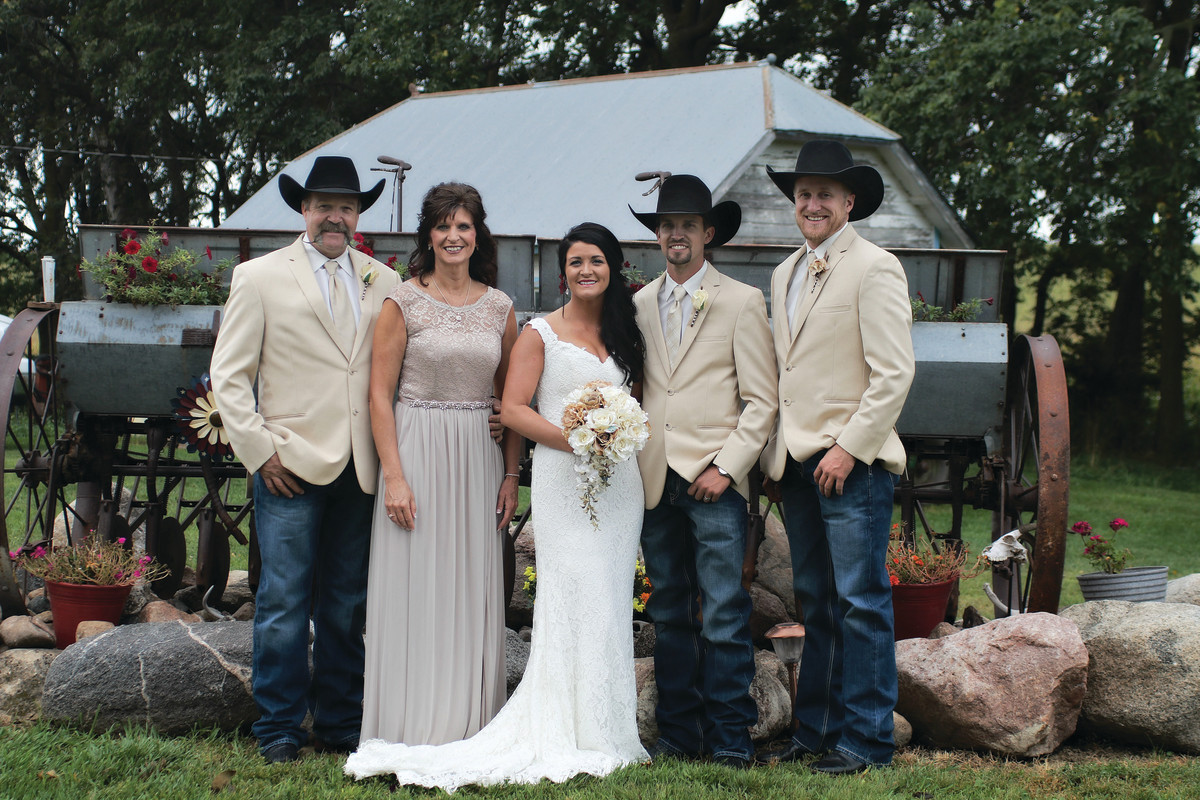
Just after noon that terrible day, Suzanne called Dalton, who had just gotten home from a baptism at church with his wife, Shaunna.
“I was in shock,” Dalton said. “I couldn’t believe that it happened. I didn’t believe that it did happen. You don’t believe a phone call saying your brother has passed away. He was my best man in my wedding. He was my only brother, and even though we fought when we were younger—every hour, minute of the day—we grew up and still had our arguments, but we were closer as we got older, and we understood each other a little more. I’m going to miss the phone calls. He could talk for hours. He’d stand there and talk to a fence post if he could. And he could argue with the best of them. You could ask anybody that and he’d agree with ya.”
Dalton stayed home in Bloomfield to take care of the family’s animals while his parents spent the night in Loveland, saying goodbye to their eldest son.
Spencer loaded Hank and Cooper into Justin’s trailer, and mustered the courage to drive his best buddy’s pickup back home to Nebraska. The Jobmans knew Justin had been working hard on Cooper, trying to make a profit on the yellow horse. Just weeks before, he’d consigned him to the Rapid City Stock Show Sale, but the horse didn’t bring what Justin had wanted.
“Steve told Gail and Suzanne, ‘I don’t know what you’d do with his horses, but if you’d ever like to sell the yellow horse, I’d like to buy him,’” Sherry said. “Suzanne asked if he wanted to buy him because he liked the horse, or because he was Justin’s. Steve knew the horse, but he wanted a part of Justin in his herd. I said we should rename him Corndog—that’s what my grandkids called Justin. They always called him Corndog and he called them Cheeseburger, I don’t know why. Suzanne texted me when we were on our way home the Wednesday after Justin died, and we figured we’d work out the details on the horse and the transfer that weekend at Justin’s funeral. But when I got my mail that afternoon, there was a big, flat-rate, high-priority envelope with Justin’s name on it sent to our address. I opened it up while I was on the phone with her and Gail and it was those horse’s papers, from the sale in Rapid City. They came to us, in Justin’s name, with our address, and there was already a transfer signed. For some reason, maybe fate, Corndog’s papers came to us.”
The rest of Justin’s horses, including Hank, are at the Cunninghams’ in Bloomfield, and one day, Gail and Dalton hope to gather up the strength to start roping again on Justin’s best mount.
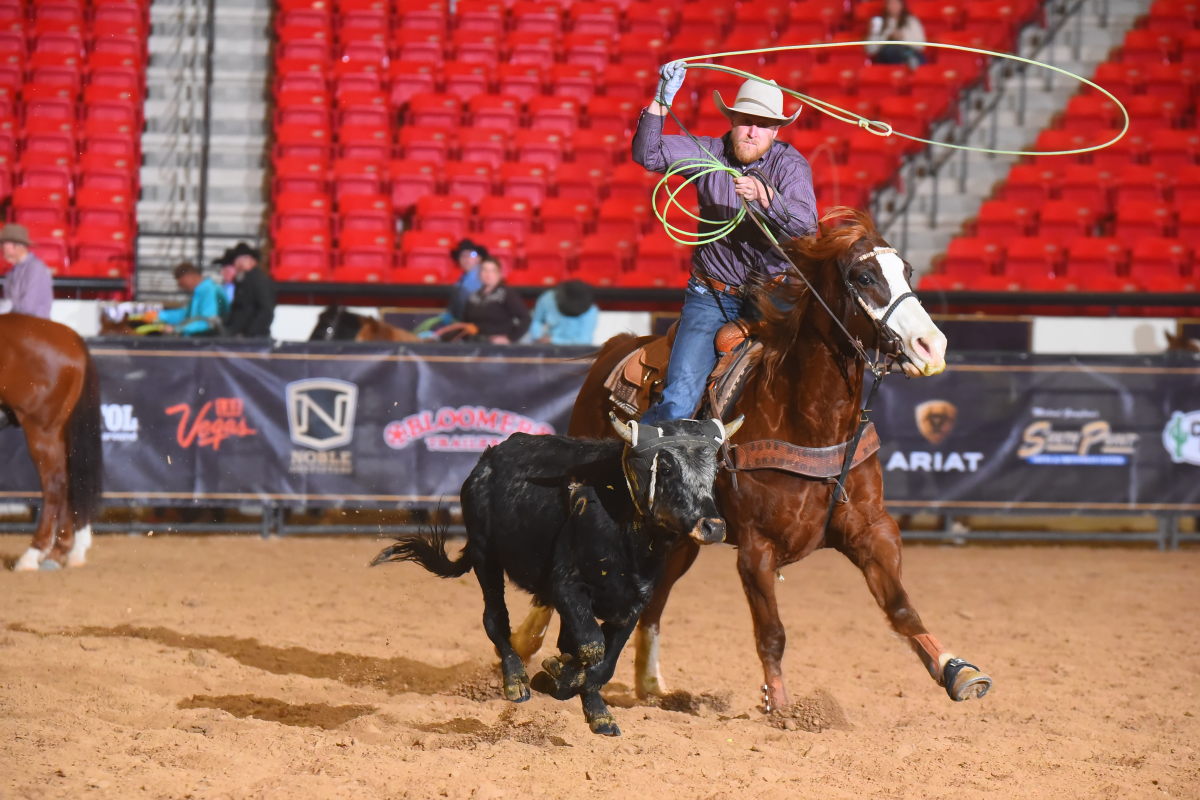
Justin was the Jobmans’ second friend to die in his living quarters trailer from carbon monoxide poisoning. He’d roped for the last few years at the memorial roping the Jobmans hosted in their indoor arena for Jeff Fleming, their former hired man who died 10 years earlier sleeping in his trailer in the parking lot of a hospital the night after the birth of his second child.
“Never before had Justin ever left that [generator] in the back of his trailer,” Sherry said. “I would always say to the boys to make sure it was outside, and Justin always had it outside. It was very unusual he didn’t this time. I don’t know if he thought it would be okay because he had opened all of the vents, all of the windows. He’d moved it to the back, maybe he thought it would be fine. It’s never okay. It’s so hard for me, because Justin was so smart. It was probably the only mistake he ever made in his life.”
Justin’s trailer did not have a CO detector, and, on that night in Loveland, when the temperature got down to negative 3 degrees Fahrenheit, Justin thought he’d be okay leaving the windows and vents open in the horse compartment, with the generator moved toward the back of the trailer. But that is never okay, Loveland Fire Lt. Jeremy Ardent said.
“The minute you start a generator like that without having it vented, you’re immediately at risk,” Ardent, who has been with the Loveland Fire District since 2004, said. “It starts to build up the minute you turn the generator on. CO is heavier than air, so it can settle into places.”
In the last five years, the Loveland Fire Department has responded to 179 CO-related incidents, Ardent said. Most were as a result of small engines operated in enclosed spaces, he said.
Annually, an average of 430 Americans die from unintentional, non-fire-related CO poisoning, according to the Center for Disease Control.
“Justin would want people to hear about what happened, and learn from it,” Dalton said. “He’d want people to be aware of their generators and get carbon monoxide detectors.”
The CDC recommends generators be at least 20 feet from any living area, and all sleeping areas should be equipped with a CO detector—something Randy Bloomer and his crew at Bloomer Trailer ensures through their conversion partners at Outlaw Conversions.
“Each one of our trailers has to have a CO detector before it leaves the conversion company,” Randy said. “Those are what save people’s lives. If you have your generator in the back of your truck, or on the ground outside—if there’s no wind, or little wind, blowing it toward the trailer, it can be enough to kill somebody. You need them in an area that’s as far from the living quarters as you can get. Portable generators are no good, period. The only way to do it is on the roof.”
A good CO detector should last 10 years, Ardent said, but batteries should be changed twice a year. Change the batteries when you change your clocks for the time change in the spring and fall, Ardent recommended.
“We’ll host the Justin Cunningham Memorial Roping every year in our indoor arena,” Sherry said. “We will give saddles and we will give CO detectors to every person who places at our roping. We’ll have battery backups, too. It NEVER should have happened. I will never walk by a trailer with a generator running in the back of the trailer—I will say, ‘Get up and get that unloaded.’ I will bang on the doors. We have to be aware of people parking too close to us, too. Every year somebody pulls in too close and their generator is running, and it will set off my CO detector on my truck. We have to park farther apart so everyone has room to run their generators. I spoke at Justin’s prayer service, and my husband did the Cowboy Prayer, and he told those gathered that there were more than 1 million hits between all of the sites that shared Justin’s story. He’s been a cowboy all his life and never touched that many people, and Justin did it in a week. Let’s talk about it.”
“If we have one thing to push out there, it is to watch out for your friends and family,” Gail said. “Don’t be afraid to stand up for what you know is right. If you know someone’s windows are down and your generator is close, make sure they’re aware and do your best to never park close. Make sure they have a detector. We can’t change the past, but we can affect the future.”
PREVENT CO EXPOSURE
• DO have your heating system, water heater, and any other gas, oil, or coal-burning appliances serviced by a qualified technician every year.
• DO install a battery-operated or battery back-up CO detector in your home, horse trailer, or RV, and check or replace the battery when you change the time on your clocks each spring and fall. If the detector sounds, leave your home immediately and call 911.
• DO seek prompt medical attention if you suspect CO poisoning and are feeling dizzy, light-headed, or nauseated.
• DON’T use a generator, charcoal grill, camp stove, or other gasoline or charcoal-burning device inside your home, basement, or garage, or near a window.
• DON’T run a car or truck inside a garage attached to your house, even if you leave the door open.
• DON’T burn anything in a stove or fireplace that isn’t vented.
• DON’T heat your house with a gas oven.
• DON’T use a generator, pressure washer, or any gasoline-powered engine less than 20 feet from any window, door, or vent.
(As an Amazon Associate, we earn from qualifying purchases made through affiliate links.)
SYMPTOMS OF CO EXPOSURE
• Tightness across the chest
• Headache
• Fatigue
• Dizziness
• Drowsiness
• Nausea
• Sudden chest pain in people with angina
During prolonged or high exposures, symptoms may worsen and include vomiting, confusion, and collapse, in addition to loss of consciousness and muscle weakness.
*Symptoms vary widely from person to person. CO poisoning may occur sooner in those most susceptible: young children, elderly people, people with lung or heart disease, people at high altitudes, or those who already have elevated CO blood levels, such as smokers.
Courtesy OSHA
WHAT CAN YOU DO IF YOU SUSPECT SOMEONE HAS BEEN POISONED?
• Move the victim immediately to fresh air in an open area.
• Call 911 or another local emergency number for medical attention or assistance.
• Administer 100-percent oxygen using a tight-fitting mask if the victim is breathing.
• Administer cardiopulmonary resuscitation if the victim has stopped breathing.
• Warning: You may be exposed to fatal levels of CO poisoning in a rescue attempt. Rescuers should be skilled at performing recovery operations and using recovery equipment.
—Courtesy OSHA
[SHOP: On-the-Road Emergency Preparedness]





